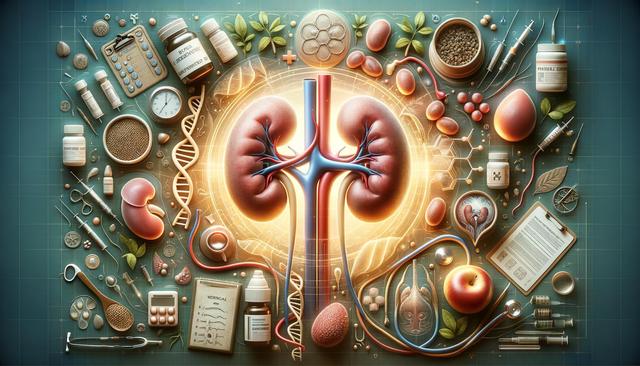Recognizing the Early Warning Signs
Understanding the early warning signs of kidney disease is essential, particularly for those with risk factors like diabetes or high blood pressure. In the early stages, symptoms may be subtle or mistaken for other conditions. However, as kidney function continues to decline, common signs can begin to emerge. These warning indicators often include fatigue, swelling in the ankles or feet, changes in urination patterns, persistent itching, and difficulty concentrating. Individuals might also experience muscle cramps or shortness of breath.
Since Stage 4 kidney disease is a critical point where kidney function is significantly reduced, early detection of these signs can make a meaningful difference in managing the condition. It is important to seek medical attention if these symptoms appear and persist. Regular screening, especially for those at higher risk, is key to catching kidney disease in its early stages, potentially delaying progression or avoiding complications.
Understanding the Link Between Chronic Conditions and Kidney Health
Chronic diseases such as diabetes and high blood pressure are closely linked to kidney health. These conditions can damage the blood vessels in the kidneys over time, reducing their ability to filter waste and maintain fluid balance. Individuals with both conditions should be especially vigilant, as they are more prone to developing chronic kidney disease (CKD).
Managing these chronic conditions effectively can help slow the progression of kidney disease. A well-structured diet for diabetes high blood pressure and kidney disease plays a crucial role here. Key dietary recommendations include:
- Limiting sodium intake to reduce blood pressure
- Controlling blood sugar through balanced carbohydrate intake
- Choosing lean proteins and healthy fats
- Monitoring potassium and phosphorus levels as advised by a healthcare provider
By managing these factors, patients may not only improve overall health but also preserve kidney function for as long as possible.
Stage 4 Kidney Disease: What It Means
At Stage 4 CKD, the kidneys function at only 15-29% of their normal capacity. This stage often brings more pronounced symptoms and a greater risk of complications, including cardiovascular issues, bone disease, and anemia. Medical professionals typically begin discussing treatment options during this phase to prepare patients for future needs.
While dialysis is a commonly known treatment for advanced kidney failure, it is not the only path forward. Exploring Stage 4 kidney disease alternatives to dialysis is important for patients who may not yet require or wish to delay dialysis. These alternatives can include:
- Strict management of underlying health conditions
- Medication to control symptoms and complications
- Dietary changes tailored to kidney function
- Frequent monitoring by a nephrologist
Considering these options early can support a more informed and proactive approach to care.
Hydration and Kidney Function
Staying properly hydrated is essential for supporting kidney health. However, the type of beverages consumed can make a difference. Many people wonder what is the best thing to drink for your kidneys. Generally, water remains the top choice, as it helps flush toxins from the body without adding unnecessary sugar or additives.
Other kidney-friendly drinks include:
- Herbal teas that are low in potassium
- Cranberry juice (in moderation) for urinary tract support
- Lemon water, which may help reduce the risk of kidney stones
Knowing what to drink to keep kidneys healthy is particularly important for those at risk or already diagnosed with kidney disease. It is also crucial to avoid beverages high in phosphorus, potassium, or added sugars, such as certain sodas, energy drinks, and fruit juices, unless advised otherwise by a healthcare provider.
Proactive Management and Lifestyle Adjustments
Living with Stage 4 CKD requires a proactive and comprehensive approach. Beyond medical treatments, patients can benefit significantly from lifestyle changes that support kidney health and overall well-being. Regular physical activity, stress management, and adherence to prescribed medications all contribute to a more stable health outlook.
Diet remains foundational. A diet for diabetes high blood pressure and kidney disease should be designed in collaboration with a dietitian or medical professional. It should avoid processed foods, limit red meat, and prioritize whole, plant-based foods when appropriate. Monitoring fluid intake is equally important, as both dehydration and fluid overload can worsen symptoms.
Support from healthcare providers, family, and community resources can also make a difference. Educational programs, support groups, and consistent follow-up care can empower individuals to take control of their health and make informed decisions about their treatment path.
Conclusion
Early awareness and recognition of kidney disease symptoms are crucial, especially as individuals approach Stage 4 CKD. Understanding the early signs, managing related conditions like diabetes and high blood pressure, and exploring alternatives to dialysis can all contribute to better outcomes. By focusing on hydration, nutrition, and lifestyle changes, patients can take important steps toward preserving kidney function and improving quality of life. Whether you are newly diagnosed or supporting someone with CKD, staying informed and engaged with care options is key to navigating this complex health condition.




Leave a Reply